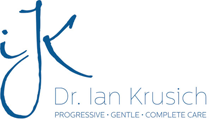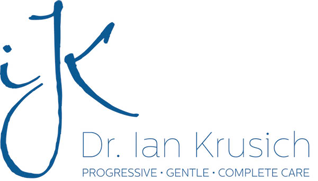What is Conservative Periodontal Care?
Periodontal disease is commonly referred to as gum disease. It begins as gingivitis where gums appear red, swollen, and may bleed a little when brushed or flossed. If left untreated, gingivitis may turn into periodontal disease where gums recede, pockets begin to form around teeth, and bone loss occurs. This can lead to periodontal abscesses, mobile teeth, and if bone loss is severe enough eventual tooth loss. In addition, inflammation from periodontal disease may add to systemic issues such as heart disease, stroke and diabetes.
Periodontal disease is serious and needs to be treated.
Dr. Krusich and his staff take your periodontal care seriously. This begins with regular hygiene appointments. While regular dental care may involve semi-annual check-ups, patients with periodontal disease may require quarterly visits to remove tarter build-up that contributes to gum disease. In addition, oral rinses and topical antibiotics might be prescribed to further reduce oral bacteria buildup.
If you, Dr. Krusich, or your hygienist, suspect gum disease, Dr. Krusich will prescribe a treatment plan to help you maintain your teeth and gums.
Advantages & Disadvantages of Periodontal Care
Advantages of Care
- Will minimize inflammation and bone loss.
- May reverse gingivitis before any permanent damage is done.
Disadvantages of Care
- Frankly, it can be more costly due to increased hygiene appointments and treatments although the alternative is further bone loss leading to tooth loss.
- Care may not always be a covered benefit in your insurance plan.
What to Expect With Periodontal Care
If you are diagnosed with periodontal issues, you ought to expect the following:
- You’ll need to schedule more regular hygiene visits for root planing and scaling along the gum line.
- During these visits, a probe will be inserted to measure the gaps between your teeth and gums. These gaps will be monitored and are a clear indication of gum disease.
- You may have local antibiotics placed in the gum to kill bacteria around teeth and gums.
- You’ll probably be prescribed an oral rinse for home use like PerioMed to kill bacteria between visits.
- You might be referred to a Periodontist for more treatments if necessary.
Insurance and Periodontal Care
Gingivitis and gum disease are very common oral issues. But that doesn’t mean all insurance companies treat them the same way. When it comes to insurance, it’s best to let Dr. Krusich’s insurance coordinator, take a look at your policy and contact your provider. We need to determine exactly what they will cover and what they won’t so you’re not surprised.
Periodontal disease is a chronic condition that can only be managed. Once bone loss occurs our goal is usually geared toward stopping disease progression and maintaining the current bone levels. That is why it’s best to avoid periodontal issues *before* they occur. Regular brushing, flossing, and hygiene visits are the best defense to periodontal issues down the road.
Next Steps
If Dr. Krusich has mentioned that you have periodontal disease, please pay attention to his treatment suggestions. If you have any questions or would like a free consultation, please call our Overland Park office at 913-383-2600.



